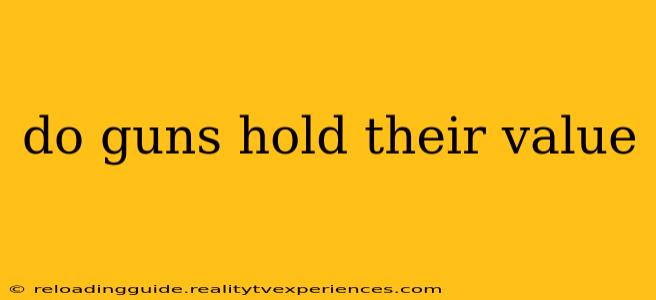The question of whether guns hold their value is a complex one, with the answer heavily dependent on several key factors. While some firearms retain their value remarkably well, others depreciate significantly over time. Understanding these factors is crucial for both buyers and sellers navigating the firearms market.
Factors Affecting Firearm Value Retention
Several factors influence whether a gun holds its value, impacting its resale price. These can be broadly categorized into intrinsic and extrinsic factors.
Intrinsic Factors: The Gun Itself
-
Brand and Model: Certain brands and models are simply more desirable than others. High-quality, well-regarded manufacturers like Colt, Smith & Wesson, and Glock generally command higher resale values. Specific models, particularly those with a strong history or limited production runs, can also fetch premium prices. Think classic revolvers or sought-after semi-automatic pistols.
-
Condition: This is paramount. A gun in excellent condition, meticulously maintained and showing minimal wear, will retain significantly more value than one that's been abused or neglected. Scratches, rust, and malfunctions all negatively impact resale value. Proper storage is crucial for preserving a firearm's condition.
-
Rarity and Collectibility: Limited edition firearms, discontinued models, or those with historical significance tend to appreciate in value over time. Collectors actively seek out these rare pieces, driving up demand and prices.
-
Caliber and Features: Popular calibers are generally more desirable and easier to resell. Specific features, such as adjustable sights, custom grips, or specialized modifications, can also influence value, but not always positively, as they may appeal to a niche market.
Extrinsic Factors: Market Conditions and External Influences
-
Market Demand: The overall demand for specific firearms fluctuates based on various factors, including current events, legislation, and economic conditions. High demand translates to better resale value, while low demand leads to depreciation.
-
Legislation and Regulations: Changes in gun laws can drastically affect the value of certain firearms. Bans or restrictions on specific models or calibers can significantly reduce their resale price. Conversely, loosening regulations can sometimes boost demand.
-
Economic Conditions: During economic downturns, the demand for luxury items, including some firearms, may decline, impacting resale value. Conversely, in times of economic uncertainty, some may see firearms as a tangible investment, increasing demand.
-
Location: Local market conditions and regional preferences play a role. The demand for particular firearms might be higher in certain geographic areas than in others.
Understanding Depreciation: When Guns Lose Value
Even highly desirable firearms can depreciate, albeit at varying rates. Factors contributing to depreciation include:
-
Technological Advancements: Newer firearms often offer improved features, making older models less desirable.
-
Wear and Tear: Normal use and lack of proper maintenance will inevitably lead to some level of depreciation.
-
Market Saturation: An oversupply of a particular firearm in the market can depress its price.
Conclusion: It's Not Always a Sure Thing
The simple answer to "Do guns hold their value?" is: it depends. While some firearms can appreciate in value, especially rare or collectible ones, many will depreciate over time. Careful consideration of the intrinsic and extrinsic factors discussed above is crucial for making informed decisions when buying, selling, or investing in firearms. Researching specific models and market trends is essential for understanding the potential resale value of any given firearm.

